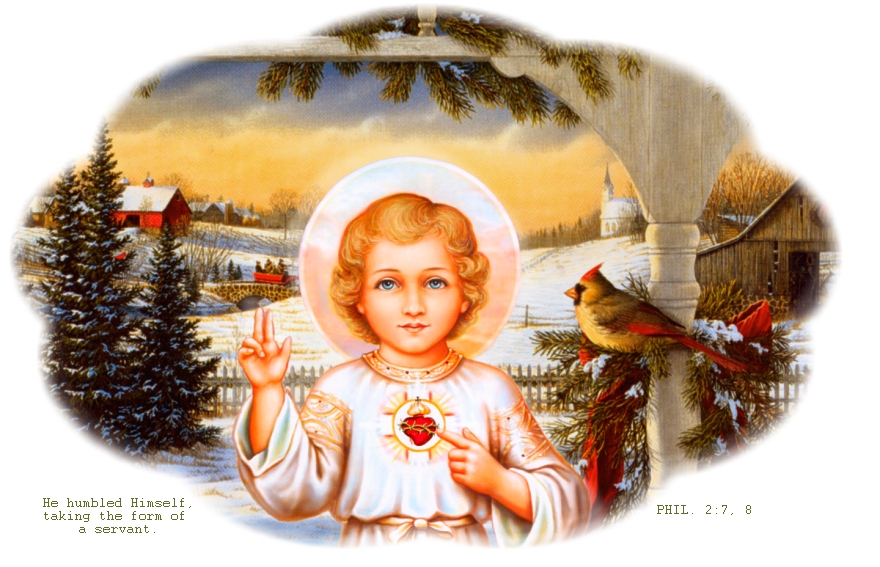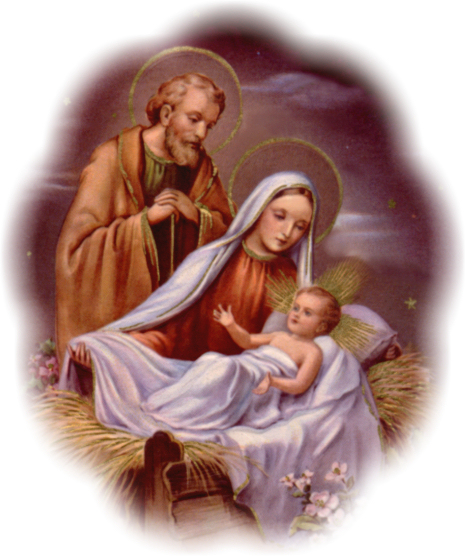  DISCOURSES FOR ADVENT Taken from THE INCARNATION, BIRTH AND INFANCY OF JESUS CHRIST by St. Alphonsus Liguori THE REDEMPTORIST FATHERS 1927 With Nihil Obstat and Imprimatur DISCOURSE II The Eternal Word Being Great Becomes Little Part 1 Parvulus natus est nobis et filius datus est nobis. "A Child is born to us, and a Son is given us."---Isaiah 60:6 Plato said that Love is the loadstone of love. Hence, comes the common proverb, as St. John Chrysostom re marks: "If you wish to be loved, love," for certainly there is no more effectual means to secure for one's self the affections of another than to love him; and to make him aware that he is loved. But, my Jesus, this rule, this proverb, holds good for others, holds good for all, but not for Thee. Men are grateful to all, but not to Thee. Thou art at a loss what further to do, to show men the love Thou bearest them; Thou hast positively nothing more to do, to allure the affections of men; yet, in point of fact, how many are there among mankind who love Thee? Alas! the greater number, we may say, nearly all, not only do not love Thee, but they offend Thee and despise Thee. And shall we stand in the ranks of these heartless wretches? God has not earned this at our hands; that God, so good, so tender of us, Who, being great, and infinite greatness, has thought fit to make Himself little in order to be loved by us. Let us seek light from Jesus and Mary. To compass the idea of the immense love of God men in becoming Himself a Man and a feeble child for our love, it would be necessary to comprehend His greatness. But what mind of man or Angel can conceive the greatness of God, which is indeed infinite? St. Ambrose says that to say God is greater than the heavens, than all kings, all Saints, all Angels, is to do an injury to God; just as it would be an injury to a prince to say that he was greater than a blade of grass, or a small fly. God is greatness itself, and all greatness together is but the smallest atom of the greatness of God. David, contemplating the Divine greatness, and seeing that he could not and never would be able to comprehend it, could only say, O Lord, who is like to Thee? [ps. 34:10] O Lord, what greatness shall ever be found like to Thine? And how in truth should David ever be able to comprehend it, since his understanding was but finite, and God's greatness infinite? Great is the Lord, and greatly to be praised; and of His greatness there is no end. [Ps. 144:3] Do I not fill Heaven and earth, saith the Lord. [Jer. 23:24] Thus all of us, according to our mode of understanding, are nothing but so many miserable little fishes, living in this immense ocean of the essence of God: In Him we live, move, and be. [Acts 17:28] What are we, then, in respect to God? And what are all men, all monarchs of earth, and even all Saints and alll Angels of Heaven, confronted with the infinite greatness of God? We are all like or even smaller than a grain of sand in comparison with the rest of the earth: Behold, says the prophet Isaias, the Gentiles are as a drop a bucket, and are counted as the smallest grain of a balance; behold, the islands are as little dust. ... All nations are before Him as if they had no being at all. [40:15-17] Now this God, so great, has become a little Infant; and for whom? A child is born to us: for us He is born. And wherefore? St. Ambrose gives us the answer: "He is a little One, that you might be a perfect man; He is bound in swaddling-clothes, that you might be unbound from the fetters of death; He is on earth, that you might be in Heaven."  Behold, then, the Immensity become an Infant, Whom the heavens cannot contain: see Him imprisoned in poor rags, and laid in a narrow vile manger on a bundle of straw, which was at once His only bed and pillow. "See," says St. Bernard---" see power is ruled, wisdom instructed, virtue sustained. God taking milk and weeping, but comforting the afflicted!" A God Almighty so tightly wrapped in swathing-bands that He cannot stir! A God Who knows all things, made mute and speechless! A God Who rules Heaven and earth needing to be carried in the arms! A God Who feeds all men and animals, Himself having need of a little milk to support Him! A God Who consoles the afflicted, and is the joy of paradise, Himself weeps and moans and has to be comforted by another! In fine, St. Paul says that the Son of God, coming on earth, emptied Himself. [Phil. 2:7] He annihilated Himself, so to say. And why? To save man and to be loved by man. "Where Thou didst empty Thyself," says St. Bernard, "there did mercy, there did charity, more brilliantly appear." Yes, my dear Redeemer, in proportion as Thy abasement was great in becoming man and in being born an Infant, so were Thy mercy and love shown to be greater towards us, and this with a view to win over our hearts to Thyself. The Jews, although by so many signs and wonders they had a certain knowledge of the true God, were not, however, satisfied; they wished to behold Him face to face. God found means to comply even with this desire of men; He became Man, to make Himself visible to them. "Knowing," says St. Peter Chrysologus, "that mortals felt an anguish of desire to see Him, God chose this method of making Himself visible to them." And to render Himself still more attractive in our eyes, He would make His first appearance as a little Child, that in this guise He might be the more charming and irresistible; He showed Himself an Infant, that He might make Himself the more acceptable in our eyes, says the same St. Chrysologus. "Yes," adds St. Cyril of Alexandria, "He abased Himself to the humble condition of a little Child in order to make Himself more agreeable to our hearts." "For our advantage was this emptying made." For this indeed was the form most suitable to win our love. The prophet Ezechiel rightly exclaimed that the time for Thy coming on earth, O Incarnate Word, should be a time of love, the season of lovers: Behold, Thy time was the time of lovers. [16:8] And what object had God in loving us thus ardently, and in giving us so clear proofs of His love, other than that we might love Him? "God loves only in order to be loved," says St. Bernard. God Himself had already said as much: And now, O Israel, what does the Lord thy God require of thee, but that thou fear and love Him? [Deut. 10:12] In order to force us to love Him God would not commission others, but chose to come Himself in person to be made Man and to redeem us. St. John Chrysostom makes a beautiful reflection on these words of the Apostle: For nowhere doth He take hold of the Angels, but of the seed of Abraham He taketh hold. [Heb. 2:16] Why, asks the Saint, did he not say received, but rather apprehended? Why did not St. Paul simply say that God assumed human flesh? Why would he affirm with marked emphasis that He took it, as it were, by force, according to the strict meaning of the word apprehend? He answers that he spoke thus, making use of the metaphor of those who give chase to the flying. By this he would convey the idea that God already longed to beloved by man, but man turned his back upon Him; and cared not even to know of His love; therefore God came from Heaven, and took human flesh, to make Himself known in this way, and to make Himself loved, as it were, by force by ungrateful man, who fled from Him, For this, then, did the Eternal Word become Man; for this He, moreover, became an Infant. He could, indeed, have appeared upon this earth a full-grown Man, as the first man Adam appeared. No, the Son of God wished to present Himself under the form of a sweet little Child, that thus He might the more readily and the more forcibly draw to Himself the love of man. Little children of themselves are loved at once, and to see them and to love them is the same thing. With this view, says St. Francis de Sales, the Eternal Word chose first to be seen among men as an Infant, to conciliate to Himself the love of all mankind. St. Peter Chrysologus writes: "How should our Lord come, Who wishes to drive away fear, to seek love? What breast so savage as not to soften before such a Childhood? What hardness which it will not subdue, what love does it not claim? Thus, therefore, He would be born Who willed to be loved and not feared." The Saint would say that if our Redeemer had come to be feared and respected by men, He would have come as a full-grown Man and with royal dignity; but because He came to gain our love, He chose to come and to show Himself as an Infant, and the poorest of Infants, born in a cold stable between two animals, laid in a manger on straw, without clothing or fire to warm His shivering little limbs: "thus would He be born, Who willed to be loved and not feared." Ah, my Lord! who was it that drew Thee from Heaven to be born in a stable? It was love, the love Thou bearest toward men. Who took Thee from the right hand of Thy Father, where Thou sittest, and placed Thee in a manger? Who snatched Thee from Thy throne above the stars, and put Thee to lie on a little straw? Who changed Thy position from the midst of Angels, to be placed betwixt a pair of beasts? It was all the work of love; Thou inflamest the seraphim, and dost Thou not shiver with cold? Thou supportest the heavens, and must Thou be now carried in the arms? Thou providest food for men and beasts, and now dost Thou crave a little milk to sustain Thy life? Thou makest the Seraphim happy, and now dost Thou weep and moan? Who has reduced Thee to such misery? Love has done it: "Thus would He be born Who willed to be loved and not feared."  Love then, love, O souls, exclaims St. Bernard, love now this little Child, for He is exceedingly to be loved "Great is the Lord, and exceedingly to be praised. The Lord is a little One, and exceedingly to be loved." Yes, says the Saint, this God was already existing from eternity, as He is now worthy of all praise and reverence for His greatness, as David has sung: Great is the Lord all exceedingly to be praised. [Ps. 144:3] But now that we behold Him become a little Infant, needing milk, and unable to stir Himself, trembling with cold, moaning and weeping looking for some one to take and warm and comfort Him; ah, now indeed does He become the most cherished one of our hearts! "The Lord is a little one, and exceedingly to be loved!" We ought to adore Him as our God, but our love ought to keep pace with our reverence towards a God so amiable, so loving. St. Bonaventure reminds us that "a child finds its delight with other children, with flowers, and to be in the arms." The Saint's meaning is, that if we would please this Divine Infant, we too must become children, simple and humble; we must carry to Him flowers of virtue, meekness, of mortification, of charity; we must clasp him in the arms of our love. And, O man, adds St. Bernard, what more do you wait to see before you will give yourself wholly to God? See with what labor, with what ardent love, your Jesus has come down from Heaven to seek you. Hearken, he goes on to say, how, scarcely yet born, His wailings call to you, as if He would say, O soul of Mine, it is thee I am seeking; for thee, and to obtain thy love, I am come from Heaven to earth. "Having scarcely quitted the Virgin's womb, He calls thy beloved soul after the manner of infants, Ah, ah, My soul, My soul! I am seeking you; for you am I making this pilgrimage." O God, even the very brutes, if we do them a kindness, if we give them some trifle, are so grateful for it; they come near us, they do our bidding after their own fashion, and they show symptoms of gladness at our approach. And how comes it, then, that we are so ungrateful towards God, the same God Who has bestowed His whole Self upon us, Who has descended from Heaven to earth, has become an Infant to save us and to be loved by us? Come, then, let us love the Babe of Bethlehem, is the enraptured cry of St. Francis; let us love Jesus Christ, Who has sought in the midst of such sufferings to attach Our hearts to Him. |

